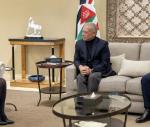You are here
Will we backtrack on political reform?
Feb 06,2025 - Last updated at Feb 06,2025
Political elites in Amman are discussing the closing or at least postponing and slowing down the political reform process, for various reasons. Chief among these are the challenges Jordan faces in defining its relationship with the administration of US President Donald Trump, whether it relates to receiving refugees from Gaza or issues concerning the West Bank, the fate of Jerusalem and the entire Palestinian issue, which is currently going through a difficult phase. According to this group of elites, the current moment is not suitable for focusing on internal disagreements, problems and issues at the expense of the more critical matter related to Jordan’s national security.
These political elites add that the political reform project has not produced strong, effective political parties that would assist the state in facing challenges or offer alternative policies and programmes. On the contrary, these parties – from their perspective – have turned into a burden on the state. Their behaviour in the parliament does not indicate political maturity or clear political awareness.
On the other side, the group that has benefitted the most is the Islamic Action Front, the main political opposition in the country, which has a consistently tense relationship with the state's political institutions. This implies that political reform has only increased internal political tensions without achieving its intended goals, such as building strong bridges between the state and society, developing political platforms capable of producing policies and empowering new, young elites to bridge the growing trust gap between successive governments and the Jordanian street.
The bad news for this conservative, sceptical group of political elites is that the high decision-making circles do not support closing the file of political reform or regretting the bet on political parties. On the contrary, in the upcoming phase, there will be numerous large workshops for political parties to develop them based on lessons learned from the previous phase, in order to avoid repeating past mistakes. There are currently signs of deep reviews within many political circles regarding this process and how to correct, fix and develop political parties, rooting their role in the country's future political life.
The decision-making circles are convinced of several key theories. The first is that backtracking on political reform would be a huge mistake that harms the credibility of the state and its symbolic and political capital. The cost in terms of political legitimacy and reputation would be catastrophic. Instead, the best approach is to learn from the lessons and develop the process, strengthen the position of political parties, and move to a new phase where there are specific, strong parties capable of developing their tools, discourse and political communication abilities with the popular base. This option affirms that turning back and ignoring political parties is not on the table in decision-making circles today.
On the other hand, the biggest danger is that retreating from the party experiment would cancel out what was achieved during the previous preparatory stage, which saw the birth of many political parties and enthusiasm among young elites to join them. It also helped break the culture of fear around political and party work among large social segments, especially those who previously avoided engaging with party movements. Such a retreat or even the suggestion of it would lead to the alienation of these social segments, which have traditionally supported official policies. This would squander the opportunity for political, organisational and intellectual structuring of this main segment in political life, negatively impacting the government's ability to mobilise and rally support. This would also maintain the "sustained gap" between the government and the street, as shown over two decades of public opinion surveys conducted by the Strategic Studies Centre at the University of Jordan.
The second theory supporting the decision-making circles' insistence on political reform is that building and developing political parties, and establishing political traditions and concepts of party work, does not happen overnight or through political decisions. It is a cumulative process linked to real-world practices that lead political parties to institutionalise and build bridges with the social bases they are supposed to represent in the political process.
The third theory emphasising the importance of political reform is that building internal consensus and a strong domestic front, along with developing institutional political work, is the paved road to the future. There is no human invention other than political parties capable of developing national policies, qualifying young leaders and building a strong civil state. This type of state is the key to the ability to sustain and progress into the next phase.













Add new comment